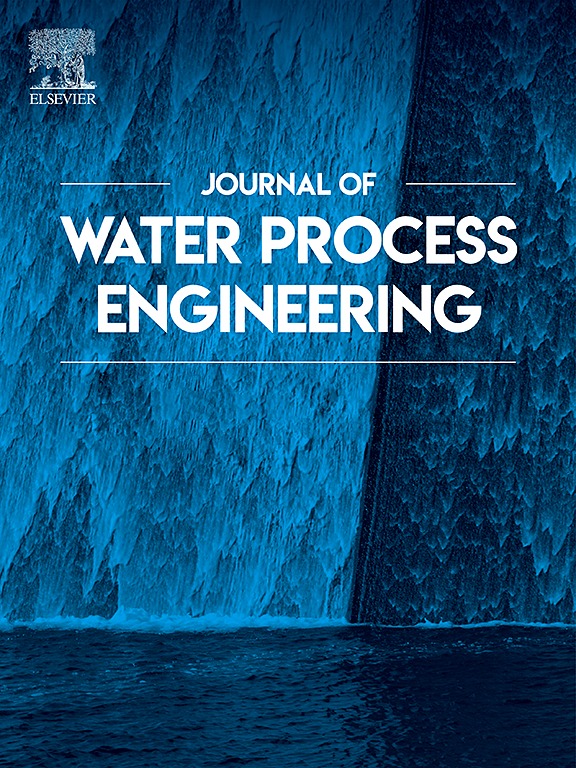Deciphering sustainability and carbon neutrality for effective treatment of rural wastewater: A review of development and perspectives of biofiltration process
IF 6.3
2区 工程技术
Q1 ENGINEERING, CHEMICAL
引用次数: 0
Abstract
With the growing emphasis on green, low-carbon, energy-efficient, and emission-reduction practices in wastewater management, rural wastewater, characterized by its decentralized nature and fluctuating water quality, requires the urgent development of carbon-neutral treatment technologies. In water-scarce regions, rural populations often reuse domestic wastewater, leading to higher concentrations of organic pollutants compared to urban wastewater. Biofiltration process has become widely adopted in rural wastewater treatment due to its advantages, such as minimal land use, high resistance to impact loads, low operational costs and potential sustainability. This study examines the importance and necessity of carbon-neutral treatment for rural wastewater by critically analyzing the strengths and weaknesses of current carbon-neutral processes. Results of this study also highlight the potential of biofiltration process in achieving carbon neutrality in effective treatment and management of rural wastewater. Various advanced processes that align with carbon neutrality principles (e.g., sulfur autotrophic denitrification, pyrite autotrophic denitrification, anammox, and simultaneous short-range nitrification, anammox, and denitrification) are introduced and discussed as promising future directions for organic and inorganic pollutants removal. This study offers a novel approach to the development of biological treatment technologies for rural wastewater, emphasizing the integration of carbon-neutral concepts to enhance energy efficiency and reduce emissions in wastewater treatment.
破解可持续性和碳中和,有效处理农村废水:生物过滤工艺的发展与展望综述
随着人们对绿色、低碳、节能和减排的废水管理方式的日益重视,农村废水因其分散性和水质波动性的特点,迫切需要开发碳中和处理技术。在缺水地区,农村人口经常重复使用生活污水,导致有机污染物的浓度高于城市污水。生物滤池工艺具有占用土地少、抗冲击负荷能力强、运行成本低和潜在的可持续性等优点,已在农村污水处理中得到广泛采用。本研究通过批判性地分析当前碳中性工艺的优缺点,探讨了农村污水碳中性处理的重要性和必要性。研究结果还强调了生物过滤工艺在有效处理和管理农村废水方面实现碳中和的潜力。本研究还介绍并讨论了符合碳中和原则的各种先进工艺(如硫自养反硝化、黄铁矿自养反硝化、氨氧化以及同时短程硝化、氨氧化和反硝化),并将其作为去除有机和无机污染物的未来发展方向。这项研究为农村废水生物处理技术的发展提供了一种新方法,强调在废水处理过程中融入碳中性概念,以提高能效和减少排放。
本文章由计算机程序翻译,如有差异,请以英文原文为准。
求助全文
约1分钟内获得全文
求助全文
来源期刊

Journal of water process engineering
Biochemistry, Genetics and Molecular Biology-Biotechnology
CiteScore
10.70
自引率
8.60%
发文量
846
审稿时长
24 days
期刊介绍:
The Journal of Water Process Engineering aims to publish refereed, high-quality research papers with significant novelty and impact in all areas of the engineering of water and wastewater processing . Papers on advanced and novel treatment processes and technologies are particularly welcome. The Journal considers papers in areas such as nanotechnology and biotechnology applications in water, novel oxidation and separation processes, membrane processes (except those for desalination) , catalytic processes for the removal of water contaminants, sustainable processes, water reuse and recycling, water use and wastewater minimization, integrated/hybrid technology, process modeling of water treatment and novel treatment processes. Submissions on the subject of adsorbents, including standard measurements of adsorption kinetics and equilibrium will only be considered if there is a genuine case for novelty and contribution, for example highly novel, sustainable adsorbents and their use: papers on activated carbon-type materials derived from natural matter, or surfactant-modified clays and related minerals, would not fulfil this criterion. The Journal particularly welcomes contributions involving environmentally, economically and socially sustainable technology for water treatment, including those which are energy-efficient, with minimal or no chemical consumption, and capable of water recycling and reuse that minimizes the direct disposal of wastewater to the aquatic environment. Papers that describe novel ideas for solving issues related to water quality and availability are also welcome, as are those that show the transfer of techniques from other disciplines. The Journal will consider papers dealing with processes for various water matrices including drinking water (except desalination), domestic, urban and industrial wastewaters, in addition to their residues. It is expected that the journal will be of particular relevance to chemical and process engineers working in the field. The Journal welcomes Full Text papers, Short Communications, State-of-the-Art Reviews and Letters to Editors and Case Studies
 求助内容:
求助内容: 应助结果提醒方式:
应助结果提醒方式:


